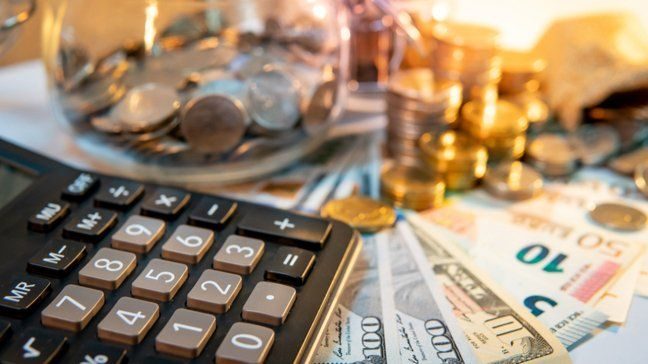Compound interest is the foundation of building wealth, but how does it work?
To use the words of Benjamin Franklin: “Money makes money. And the money that money makes, makes more money.”
Using our simple Compound Interest Calculator can help you quickly see how investing on a regular basis can turn small sums into large amounts.
Try it out below:
Compound Interest Calculator
How to use the Compound Interest Calculator
The Compound Interest Calculator can be used to provide you with two important pieces of information about your investment:
- The total value of your investment at the end of the investment term
- How much interest you’ll earn over the full term of the investment
And not only can the calculator provide you with this information about a specific investment, but you can also use it to compare multiple investments to determine which will be the best one to choose.
Here’s how the calculator works, and what to put in each field:
Initial investment
Enter the amount of money you will be investing, or have already invested in your account. This is the starting point to calculate your future investment growth.
Deposit amount
This is the amount of money you wish to invest on a regular basis. While the amount you actually invest may vary, this number should be the average of all your periodic deposits over the life of the investment.
For example, if you wish to invest $100 per month, input the number $100.
Deposit basis
Enter the frequency of your regular deposits. It can be yearly, semi-annually, quarterly, or monthly. If you plan to make weekly deposits, just multiply the deposit amount by 4.333 and set the frequency to monthly.
Interest rate
Enter the annual rate of return you expect on your investment over the entire term. For example, the S&P 500 index has returned an average of over 10% per year over the past 90+ years.
Interest is compounded
Enter the frequency of compounding, which should be provided by the bank or other financial institution where your investment will be held. The calculator gives you a choice between yearly, semi-annually, quarterly, monthly, and daily. Most investment returns are compounded on an annual basis when calculated.
Number of years
Use the slide bar to enter the number of years you’ll hold that particular investment. You can enter anywhere from one year to 35 years.
Once the required information has been entered, hit the “Calculate” button.
Total value of investment
This is the total value of your investment based on your initial investment, recurring investment plan, and annual interest rate. This includes your contributions and investment growth.
Total interest earned
This number takes the total value of the investment at the end of the plan, and subtracts your contributions. This is purely the amount of growth your investment earned.
Investing and compound interest
When you are investing, it is important to note that investment returns are typically inclusive of any dividends your investments pay out. The rate of return assumes that you re-invest those dividends to buy more of the investment you are holding.
This makes it crucial to set up a dividend reinvestment plan (DRIP) within your brokerage or retirement account to take full advantage of compounding returns.
And while the calculator assumes the same growth every year, the reality is that the stock market and other investments rarely return the same amount annually. There are ups and downs, but over a longer time horizon (say, 30 years), the average rate of return is what you want to focus on.
If your investment time horizon is much shorter term, the calculator assumptions may be way off. For example, if you are invested in the stock market for five years, the returns may actually be negative over that time period.
Compound interest can exponentially increase your money, but one of the most important components is time. The more time you let your money compound, the more wealth you can build.
Read more: Essential advice to help you start investing
How inflation affects compound interest
Inflation is a hot topic right now, and for good reason. It erodes our spending power and makes the cost of nearly everything go up.
But how does inflation affect compound interest?
Simply put, inflation erodes your returns; tomorrow’s dollars are worth less. If you expect to earn an 8% return on your investments, and inflation increases annually at 4% during that time period, your real rate of return is only 4%.
While inflation is higher than average in 2022, the long-term average inflation rate is near 3% annually. To account for this in your calculation, you can take your expected rate of return, and subtract 3% from it to get a more accurate calculation based on today’s purchasing power.
Read more: How to create an inflation-proof portfolio
Summary
Our Compound Interest Calculator is a powerful tool to show you the possibilities of investing over a long period of time. Play around with the calculator to see how different investments will perform, and increase or decrease your deposit amounts and frequency to see how that affects your total return.
While investing can be a slow process for the first 10 years or so, when you lengthen your time horizon to 30 years (or more), you will see how compound interest truly does the heavy lifting for you. Building wealth takes time, but consistent investing in high-quality assets can get you there.


